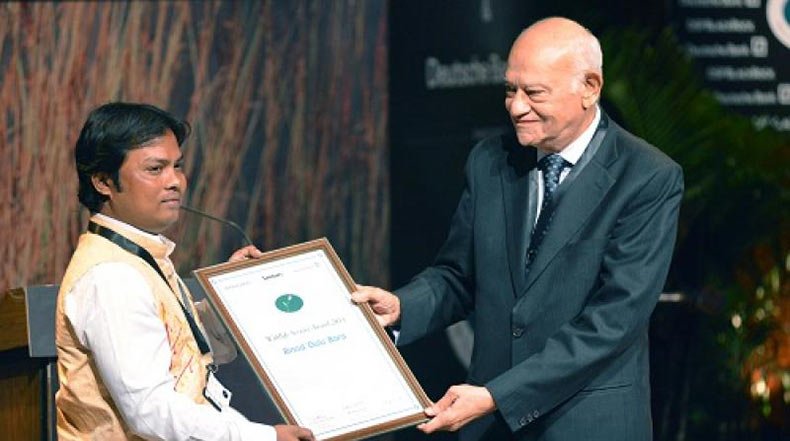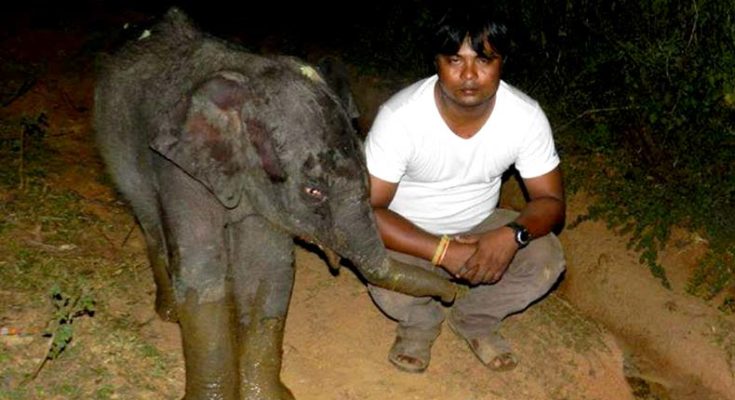Binod Dulu Borah has become the man of inspiration for safeguarding wildlife. Image Courtesy – The Better India
‘Chhapannala’ is a small village just below the Karbi hill in Naogaon district in Assam. An incident took place 31 years ago on a rainy night. A seven-year-old boy was lying in bed with her mother. That night, calls of various animals were wandering through the forest surrounded by mountains. The little boy Dulu could distinguish every call of an animal, be it a bird or an animal.
Dulu woke up suddenly at midnight with a strange sound. He heard the sound with his raised ears and tried to awaken the housemates, saying that a baby elephant had fallen into a nearby well, and it should be saved. But, unfortunately, the housemates did not give importance to his words. As a result of that, Dulu could not sleep that night.
The next morning, it was reported that a baby elephant had fallen down inside a well near Dulu’s house, and it was now dead. He became a stone in agony. He took a resolution at that very young age that he would not wait any longer for anyone’s permission. One life of an animal went unnoticed due to the negligence of elderly people; from then onwards, he alone would save the lives of the animals.
When Binod Dulu Borah was only 14 years old, he used to come down to the rescue of endangered wildlife alone and without anyone’s permission. Usually, birds, turtles, and small mammals were caught from the jungle and wetlands and sold in a meat shop at a weekly market near their village. he started to go to the market, hiding from the people in their house, and he used to buy birds with whatever money he had at that moment. After buying a bird, he used to set them free in the jungle. It has become an addiction to him, and he started doing small jobs at a very young age to earn money.
Read: Sunitha Krishnan is the synonym of Women’s Empowerment
An Assam-based NGO named ‘Green Guard Nature Organisation’ (GGNO) came to assist him in his lonely battle to protect wildlife when Dulu Borah was 19 years old. From that day, they have been working together.
After being rescued alive from animal smugglers, Binod Dulu Borah used to keep them in his home for a certain period, and then return the animals to the place from where they had been rescued. He treats sick and injured animals in his own home. However, if the animals or birds give birth, he used to send their babies to the ‘Centres for Wildlife Rehabilitation and Conservation’ in Assam.
Dulu has launched a ’24×7′ helpline to rescue endangered wildlife. He says that this phone number is open all day and night, and he grabs each phone call, be it morning or midnight, because informers may call at any moment for the rescue of animals. He always relies on his motorbike, which makes him reach that area quickly.
Dulu created a team of forest guards with strong willpower like his. When they see suspicious behaviour of local or exotic people with livestock, they inform him on the phone, and he then goes out for action.
Dulu Borah shared some of his experiences of life adventure:
There is a village named Udmari in Assam, in which the villagers are born hunters. They used to eat the meat of wild animals. Dulu went there after hearing the story and faced an awkward situation. Some villagers were trying to kill a giant snake by throwing stones at it.
Dulu became the guard for the snake and started bearing their stone-throwing. Suddenly, he got a blow to stone on his head with a stone thrown by villagers. It started bleeding from his head. The snake was just behind him, and it could bite him if he moved. After 10 minutes had passed, the villagers were astonished that a man had been standing there and bearing their torture of stone throwing continuously, they stopped attacking him and went back to their village. The snake also went back to the jungle and did not bite him.
Once upon a time, some people in a remote village on the hill were forcibly holding a baby elephant. The superstitious and intoxicated people were demanding that the baby elephant be gifted to them by God. Binod Dulu Borah reached there after receiving the news from an informer. The villagers became very angry on seeing him at the spot and came rushing to him with whatever arms they had in their hands – axe, stick, bow and arrow, etc. Someone was fired from a hunting gun. He was compelled to run away to save his life for the time being.
But his battle did not end there; he silently went to the village that night alone. The villagers were in deep sleep after having consumed wine on that cold night on the hill. As he was an expert at calling in elephant’s tone, he began calling like a mother elephant from a distance. After hearing the call of an elephant, the baby elephant came to Dulu by running, assuming that its mother was calling. Dulu then started running outside the village with duplicating the elephant’s call, and the baby elephant was also running behind him. After crossing the dangerous forest area running with the baby elephant, Dulu at last delivered the baby to the safe custody of ‘Wildlife Rehabilitation and Conservation’. That was the way he saved an animal’s life without conflicting with the villagers.

The area of Karbi Hills in Assam had been suffering from a problem. Herds of elephants occasionally entered the villages due to a lack of food. They used to destroy crops, and as a result of that, collisions between elephants and villagers had been a daily routine. Sometimes the elephants lost their lives in conflict, and sometimes villagers lost their lives. Since then, Dulu came forward to solve the problem. Dulu has planted 45,000 banana trees in 200 bighas of land at the bottom of the Karbi hills over 8 years to supply food for the elephants. As a result of that human-elephant conflict has been greatly reduced.
Binod Dulu Borah is now 38. He has already rescued 3,000 animals and reptiles. Elephant cubs, baby leopard, baby bears, pygmy monkeys, Chinese pangolin, deer, wild rabbits, chameleon of rare species, various species of reptiles, flying squirrels, wildcats and many other animals are among them. Besides, Dulu has recovered thousands of snakes, turtles and about 2,000 birds of rare species.
While sharing his experiences on returning animals to the jungle, he said that he used to feel happy at the core of his heart. He also mentioned his feeling –once after returning a leopard to a jungle, the leopard looked back at him for a long time as if it was trying to pay gratitude with its wild eyes. The leopard’s vision touched Dulu Borah.





